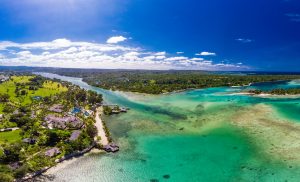The verdant islands of the Pacific, often romanticized as serene havens, are the latest battlegrounds in the geopolitical chess match between China and Western powers. The recent donation of a presidential building complex by China to Vanuatu and the inauguration of an airstrip by Australia and New Zealand in the Solomon Islands underscore a growing rivalry that is as strategic as it is symbolic.
China’s Strategic Benevolence
On the surface, China’s donation of a presidential palace and a suite of government buildings to Vanuatu might seem like an act of goodwill. Hu Chunhua, vice-chairman of the National Committee of the Chinese People’s Political Consultative Conference, ceremoniously handed over the structures, replete with Chinese dragon dancers and kava brewing. The symbolism was potent: China is not merely a distant benefactor but a vibrant, active partner in Vanuatu’s development.
This gesture, however, is more than philanthropy. China is Vanuatu’s largest external creditor, holding approximately 40 percent of its external debt. By embedding itself deeply into the fabric of Vanuatu’s governance and infrastructure, China is crafting a relationship built on dependency. Critics argue that this approach, often termed “debt-trap diplomacy,” aims to leverage financial indebtedness into political allegiance. Beijing’s ambassador to Vanuatu, Li Minggang, expressed China’s readiness to “step up pragmatic cooperation,” a phrase that, to skeptics, reads as a euphemism for tightening the noose of influence.
The Western Counterplay
Meanwhile, in the Solomon Islands, a different kind of infrastructure was unveiled. New Zealand Foreign Minister Winston Peters, alongside Solomon Islands Prime Minister Jeremiah Manele, inaugurated a $36.55 million airstrip funded by New Zealand and Australia. This project, while not as grandiose as Vanuatu’s new presidential complex, is a strategic asset. Airstrips are not just runways; they are lifelines for remote islands, enabling swift movement of goods, people, and potentially, military assets.
Australia and New Zealand’s involvement in Solomon Islands signifies a concerted effort to counter China’s growing influence. Solomon Islands, with security ties to both China and Australia, is a microcosm of the broader strategic contest in the Pacific. Manele’s recent visits to both countries highlight the delicate balancing act that Pacific nations must perform. They are courted by both sides, each promising development and security, each expecting loyalty in return.
A New Cold War in the Tropics?
The Pacific Islands, with their small populations and limited resources, might seem peripheral in global geopolitics. Yet, their strategic value is immense. They sit astride critical maritime routes and possess exclusive economic zones (EEZs) rich in marine resources and potential underwater minerals. For China, expanding its influence here is part of a broader strategy to project power and secure maritime routes. For Western powers, it is about containing China and maintaining a free and open Indo-Pacific.
The gifts of buildings and airstrips are the modern-day equivalents of the Cold War’s economic aid and military bases. They are tools of soft power, designed to win hearts and minds while securing strategic footholds. China’s lavish infrastructure projects come with strings attached, often leading to significant debt obligations. Western projects, though sometimes less grand, aim to build resilience and self-reliance, such as funding local police forces in the Solomon Islands.
The View from the Islands
For the Pacific Island nations themselves, this influx of attention and aid is both a blessing and a curse. On the one hand, they gain much-needed infrastructure and development. On the other, they risk becoming pawns in a geopolitical game. The challenge for leaders like Vanuatu’s Prime Minister Charlot Salwai and Solomon Islands’ Prime Minister Jeremiah Manele is to navigate these waters without losing their nations’ autonomy.
Vanuatu’s acceptance of China’s grandiose gifts has sparked fears of sovereignty erosion, with the nation potentially becoming overly reliant on Beijing. The new government complex, while symbolizing progress, also represents a deeper entanglement with a superpower whose strategic ambitions are global in scale. Conversely, the Solomon Islands’ new airstrip and ongoing security reviews reflect a cautious approach to balancing influence, seeking to benefit from both sides without becoming beholden to either.
A New Pacific Dawn?
As the Pacific Islands become arenas of influence between China and Western powers, the region’s future hinges on its leaders’ diplomatic acumen. The donations of buildings and airstrips are more than infrastructure; they are symbols of a new strategic era. The challenge for the Pacific Islands is to leverage this attention to their benefit, securing development while maintaining sovereignty.
In this tropical chess game, the moves are becoming more intricate, the stakes higher. China’s grand gestures and Western strategic investments are setting the stage for a new Pacific dawn. Whether this will lead to greater prosperity or increased vulnerability for the island nations remains to be seen. One thing is certain: the Pacific is no longer a tranquil backwater but a dynamic frontier of global geopolitics.

































